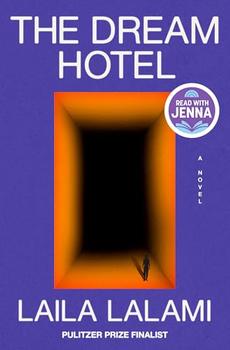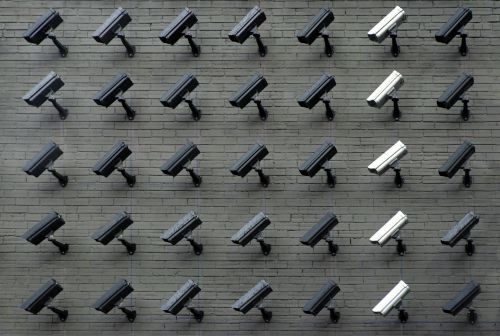Media Reviews
Boston Globe
Laila Lalami is a chronicler of cultures and an observer of human behavior toward marginalized communities. Her fifth book,
The Dream Hotel, continues in that vein, exploring how far surveillance can go in a government's attempts to stifle human rights…Lalami delivers the same message in lyrical language while subtly posing the question: Who will fight for you if a machine deems you a threat? And how will you fight for your own dignity?
The Dream Hotel is a story about the consequences of unchecked power and the small acts of resistance an individual can undertake to fight an unfair system. Sometimes fiction is the best way to look at the terrifying truth and we can use it as a manual to guide us.
Bustle
I love a good dream, but I can't stop thinking about Laila Lalami's dystopian take on the ramifications of a bad one…It might sound like total sci-fi, but Lalami conjures it up with such clarity that the Risk Assessment Administration will start feeling a little too real.
Esquire
One of the best high-concept hooks of the year…It feels like a mix between Steven Spielberg's
Minority Report and Wim Wender's
Until the End of the World, written in Lalami's silky and celebrated prose.
Literary Hub
Even though Laila Lalami's near-future thriller shares a similar premise with Philip K. Dick's
Minority Report—that is, the government abuses a pre-crime technology to prosecute people who are not yet guilty—there are so many disturbing, get-under-your-skin details that center it solely in this moment and from this author…In a time when many women are second-guessing what personal data to freely offer to apps in exchange for convenience, this is a chilling premise.
Los Angeles Times
Powerful, richly conceived…The book's corporatized reality is slightly more twisted than ours but entirely plausible…Lalami plays out the shiftiness and uncertainty of reality when dreams are given more predictive weight than facts to stunning effect…Here, rendering this edge-of-nightmare world, Lalami skates along at the height of her powers as a writer of intelligent, complex characters…As with her other novels, there's a softhearted universalism to Lalami's treatment of surveillance capitalism. Hers is one in which humans retain the ability to trust one another enough to forge working solidarities and authentic collaborations. Although it relies on a speculative technology for its plot,
The Dream Hotel is astounding, elegantly constructed, character-driven fiction. Lalami's realistic approach to Sara and others, inflected with leftist politics and history, elides any sharp division we might imagine about where we've been and what we face ahead…Within the latter part of the novel, it's not the stuff of tragedy or alarm about the human condition we encounter, but surprising, unadulterated hope.
New York Times Book Review
Lalami's social critique has a righteous vigor…The novel's central vision—a world in which the most private aspects of people's inner lives are extracted and sold—retains an insidious power, and an uncomfortable relevance.
Oprah Daily
Gripping… Lalami's exploration of the darkest possibilities of technological surveillance challenges us to think about the connection between privacy and freedom.
Pittsburgh Post Gazette
Captivating…Vibrant and fascinating…[Lalami] has a natural gift for capturing the everyday moments that draw readers in quickly and hold their attention, and her characters could easily be real, and familiar, people…
The Dream Hotel is also a very well-written thought exercise that raises serious questions about the effect our dreams have. How could information from our dreams be used, and should it? That the novel is a bit of a cautionary tale is also what adds to its allure. The reader gets the sense that although the story doesn't take place in the present day, the future it grapples with isn't all that far off.
Shelf Awareness
Lalami's bracingly resonant drama strikes at the very heart of the consumer privacy debate and the freedoms people forfeit to data-hungry conglomerates when we use their products…Lalami imbues her propulsive narrative with a sense of foreboding, and Sara's voice is captivating. Ideal for fans of Hum by Helen Phillips,
The Dream Hotel is part of an emerging genre of literature exploring motherhood in an age of unforgiving, digitally enhanced surveillance.
Today
I love this book so much…I read it in a weekend. I could not put it down. It is really relevant. It's a meditation on free will, sisterhood, the power of love, and the power of hope. It's so good.
Vulture
Unsettling, meticulously observed…This isn't Dick's
Minority Report, and it's certainly not Steven Spielberg's rollicking, ultrasleek 2002 film adaptation, with its magnetized streets and creepy high-tech pod-prisons. It's worse than all that, an alarmingly likely approximation of what we're all careering toward. Lalami has peered into the future and found that it looks like nothing so much as the present—which is to say dingy, corrupt, dumb, and dishonorable. And terrifying.
Washington Post
If you're concerned, as I am, about surveillance, data-mining, mass incarceration, a misogynistic autocracy run by rogue technocrats—or if you simply like an engrossing, well-written novel—
The Dream Hotel is your book. In her fifth novel, the Moroccan-born Laila Lalami has created a substantive, chilling near future and compelled her vivid, sympathetic characters to live in it.
Chicago Review of Books
Written by the capable hands of a modern literary star,
The Dream Hotel is the novel of our tech present and future.
The Guardian
Striking at the heart of current fears surrounding technology and control, and with distinct echoes of Orwell, Kafka and Atwood…The way [Lalami] skewers notions of supposed privacy and freedom make this less speculative fiction, more gripping allegory for our times.
Booklist (starred review)
Fans of
The Minority Report by Philip K. Dick and
Our Missing Hearts by Celeste Ng will enjoy this literary novel set in the near future."
Kirkus Reviews (starred review)
Stellar…There are echoes of
The Handmaid's Tale here—as Margaret Atwood does in that book, Lalami builds a convincing near-future dystopia out of current events…But Lalami's scenario is unique and well-imagined.
Publishers Weekly (starred review)
The premise calls to mind Philip K. Dick's
The Minority Report, but Lalami's version is chillingly original, echoing widespread fears about the abuse of surveillance technology, and she balances high-concept speculative elements with deep character work. This surreal story feels all too plausible.
 Jennifer Egan, Pulitzer Prize-winning author of The Candy House
Jennifer Egan, Pulitzer Prize-winning author of The Candy House
A gripping, Kafkaesque foray into an all-too-plausible future where data collection penetrates interior life,
The Dream Hotel is also an elegant meditation on identity and what we sacrifice, unthinkingly, for the sake of convenience.
 Rumaan Alam, author of Leave the World Behind
The Dream Hotel
Rumaan Alam, author of Leave the World Behind
The Dream Hotel offers a stark vision of the future—in which America is a surveillance state, ruled by the intertwined forces of capital and government, powered by all-too-fallible algorithm that determines criminality based on citizen's dreams. That's plainly a metaphor for extant practices of social control, but Laila Lalami's extraordinary new novel is more than just a political warning; the book is an exploration of the psyche itself, the strange ungovernable forces of fate and emotion that make us human.
Reader Reviews
Lisa G. (Port Washington, NY)
Eerie and Gripping The Dream Hotel is a gripping and eerie dystopian novel set in the near future, where technology and societal control have reached new extremes. Although I rarely read dystopian fiction, I couldn't put this book down.
The story centers on a ...
Read More
Katharine P. (Boulder, CO)
Caught by agreeing to "terms of service" I've been thinking about corporate surveillance. I've also been worried about wildfires in Los Angeles. It's not because I'm watching the news. Oh no, it's because I've been reading this book. Remember what Benjamin Franklin said about liberty and ...
Read More
Ann B. (Kernville, CA)
The Dream Hotel will ignite conversation Are we all just data resources to be farmed? This novel set in the near future poses thought-provoking questions as it makes you squirm in Kafkaesque terror, frustration, and discomfort for Sara and her sisters within the retention center. The ...
Read More
Alana G. (Palmetto Bay, FL)
A Thought-Provoking and Timely Read This is a well-written and thought-provoking book, perfect for fans of dystopian stories and women's literature. It feels very relevant to today's world, especially with concerns about privacy and how quickly we share personal information online.
...
Read More
Write your own review!

 (546 words)
(546 words)
 Laila Lalami's The Dream Hotel takes place in a dystopian future in which government surveillance extends to dreams, and people can be arrested for being deemed a risk to society based on their supposed likelihood of committing a crime. The concept of "pre-crime," or the idea that crimes can be anticipated before they occur, was also famously explored in Philip K. Dick's "The Minority Report."
Laila Lalami's The Dream Hotel takes place in a dystopian future in which government surveillance extends to dreams, and people can be arrested for being deemed a risk to society based on their supposed likelihood of committing a crime. The concept of "pre-crime," or the idea that crimes can be anticipated before they occur, was also famously explored in Philip K. Dick's "The Minority Report."


